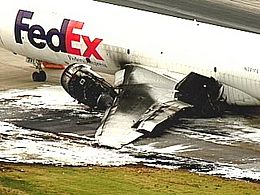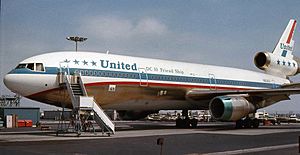FedEx Express Flight 630 facts for kids

Burnt-out wing and port-side engine after N391FE crash-landed
|
|
| Accident summary | |
|---|---|
| Date | July 28, 2006 |
| Summary | Crash landed and caught Fire due to Undercarriage failure and Metal fatigue |
| Place | Memphis International Airport, Memphis, Tennessee, United States |
| Passengers | 1 |
| Crew | 2 |
| Injuries (non-fatal) | 3 |
| Fatalities | 0 |
| Survivors | 3 |
| Aircraft type | McDonnell Douglas MD-10-10F |
| Aircraft name | Chandra |
| Airline/user | FedEx Express |
| Registration | N391FE |
| Flew from | Seattle-Tacoma International Airport |
| Flying to | Memphis International Airport, Memphis, Tennessee |
FedEx Express Flight 630 was a cargo plane flight. It flew regularly from Seattle–Tacoma International Airport to Memphis International Airport in Memphis, Tennessee. On July 28, 2006, the plane, a McDonnell Douglas MD-10-10F, had an accident. It crashed while landing because its landing gear failed.
The main left landing gear broke seven seconds after the plane touched down. This made the MD-10 roll off the runway without control. The aircraft stopped near a taxiway called M4 and then caught fire. The fire burned the wing and the left engine. All three people on board were injured, but they all survived. These included two crew members and one passenger, who was an off-duty crew member.
The Aircraft and Crew

The plane in this accident was a McDonnell Douglas MD-10-10F. Its registration number was N391FE. It was built in mid-1974, making it 32 years old at the time of the crash. FedEx Express received this plane on May 21, 1997.
Many FedEx MD-10s, including this one, were first used by United Airlines. This plane was known as Chandra. After the accident, the plane was too damaged to be repaired. It was taken apart. At the time of the crash, FedEx had 81 other MD-10F planes in its fleet.
The pilot of the flight was Captain Jayne C. Akin, who was 57 years old. She had worked for FedEx Express since 1979. She had flown planes for 16,000 hours in total. Of those, 4,223 hours were on MD-10/11 aircraft. The co-pilot was Andrew D. Macha, who was 38 years old. He joined the airline in 2004. He had 5,000 flight hours, with about 300-350 hours on the MD-10/11. Before working for FedEx, Macha served in the United States Air Force from 1991 to 2004.
The Accident Details
FedEx Flight 630 was a cargo flight from Seattle–Tacoma International Airport to Memphis International Airport. On July 28, 2006, the plane was making a visual approach to runway 18R. This means the pilots were guiding the plane mostly by looking outside. The autopilot was used at first, connected to the Instrument Landing System (ILS). The co-pilot was flying the plane for the landing.
At 1600 feet above the ground, the plane was set up for landing. At 400 feet, the autopilot was turned off. The final part of the approach was smooth. However, as the plane touched down, the left main landing gear suddenly broke. This caused the left wing to hit the runway. The plane then swerved sharply to the left. It finally stopped near taxiway M4.
The Investigation
The NTSB (National Transportation Safety Board) started an investigation into the crash. They released their final report in 2008. The report stated that the cause was a crack in a part called the air filler valve hole. This crack happened because of metal fatigue. Metal fatigue is when a material weakens over time due to repeated stress. The report also mentioned that the maintenance of this part was not good enough.
See also
 In Spanish: Vuelo 630 de FedEx Express para niños
In Spanish: Vuelo 630 de FedEx Express para niños
 | Chris Smalls |
 | Fred Hampton |
 | Ralph Abernathy |

